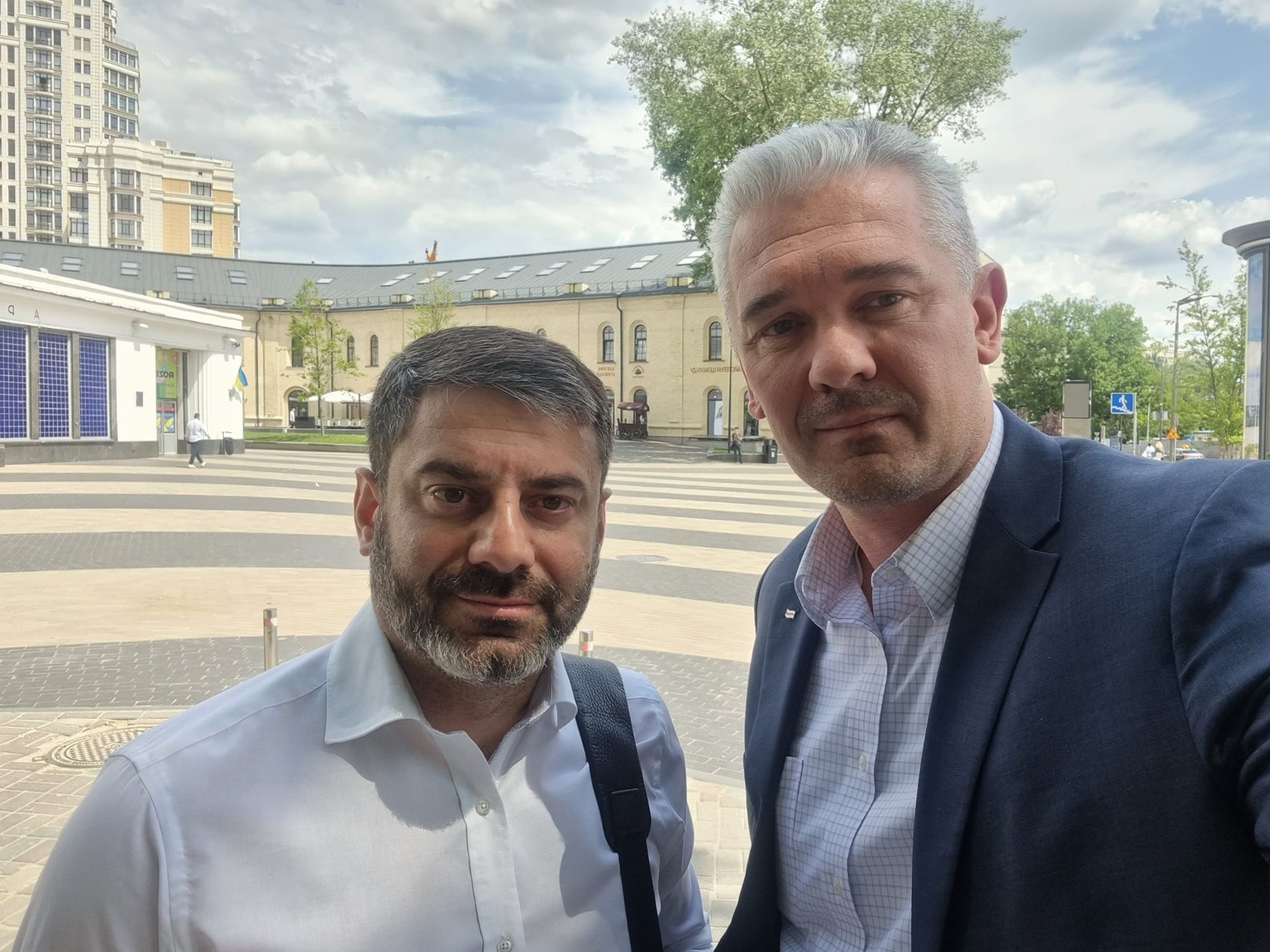Belarusians kicked out of Ukraine en masse

As Belarusian dictator Alexander Lukashenko sided with Russia in its attempt to curtail Ukrainian independence, those fleeing Lukashenko’s oppressive regime found themselves unwanted in Ukraine as well.
Since February, Belarusians in Ukraine have been facing a set of financial and bureaucratic restrictions forcing them out of the country.
The Belarusian diaspora in Ukraine has grown significantly over the past two years, as the inflow of political migrants escaping the brutal crackdown and ongoing repressions that unfolded in Belarus after the fraudulent 2020 presidential election increases.
Back then, the Ukrainian government had issued a decree allowing Belarusians a 180-day visa-free stay, double that granted to other foreigners.
In 2021 alone, Ukraine issued 4,300 residence permits to Belarusians, many of whom fled Belarus to avoid persecution. In November 2021, the decree was extended to 2022.
Now, despite officially keeping all legislation unchanged, many Belarusians who have chosen Ukraine as their new home are silently kicked out of the country.
After Ukraine's State Migration Service resumed operations in May following a nearly three-month shutdown due to the war, Belarusians who were set to prolong their legal status in Ukraine were both officially and unofficially denied the right to stay in the country.
This applied even to Belarusian activists recognized for their role in assisting Ukraine during the war.
Read the latest Belarus Weekly: Ukraine’s Armed Forces release address to Belarusian counterparts urging them to stay away from Ukraine
Vladimir Zhbankov, head of the non-governmental organization Free Belarus Center's legal assistance programs, says the organization has over 300 requests for legal assistance from Belarusian who have had their legal stay in Ukraine terminated or denied an extension, their bank accounts blocked, or their entry into the country forbidden despite having the necessary documentation.
“There are thousands -- tens of thousands -- of people with the same problems,” Zhbankov said.
Bureaucratic trap
On April 14, Ukraine's State Migration Service published a post on its official Facebook page advising foreigners with expired residence permits to submit documentation to extend their stay.
The post said that, due to the Service’s temporary closure and the introduction of martial law, foreigners will not be punished for missing deadlines.
Belarusian human rights activist and volunteer, included in the Forbes 30 Under 30 list, Anisiya Kazliuk escaped Belarus after a criminal case was brought up against seven of her colleagues in 2021.
On Feb. 23, a day before Russia’s full-scale invasion, Kazliuk received official permission to stay for additional three months in Ukraine – she was ready to apply for a residence permit.
After Kyiv was bombed the next morning, Kazliuk moved to the city of Lviv in western Ukraine. On March 24, she was told that the State Migration Service’s databases were disabled and was instructed to wait.
Her status was now unknown.
On May 12, Head of the State Migration Service Natallia Naumenko announced that services for foreigners, including Belarusian nationals, were restored.
Days later, the first fines for exceeding official stay and the “forced return notices'' began to reach Belarusians in Ukraine.
Kazliuk was detained in Kyiv after showing up at her tactical medicine training under the assumption that she was not violating the terms of her stay.
"At the migration department, I tried to explain the situation, but no one cared," Kazliuk told the Kyiv Independent. "A man in the migration department examined my papers and started yelling at me in foul language, threatened to beat the sh*t out of me," Kazliuk went on, “shouted about missiles from Belarus territory.”
“I received a minimal fine and a notice that I must leave the country,” she added.
Read also: Does Belarus' military have the capacity to attack Ukraine?
Kazliuk notes that she is a recognized human rights activist and that she will be able to seek asylum and employment in Europe.
“But if I leave, I will not be able to help Ukraine and Belarusian volunteers who are fighting at the front. If I leave, I will have to start my life all over again for the second time in a year,” Kazliuk said.
Karyna Patsiomkina also fled Belarus for Ukraine to avoid criminal persecution and has since been volunteering in Bucha, Kyiv Oblast, to clear debris and remove those killed by Russian forces.
Although she was awarded a letter of gratitude for her efforts by local authorities, she fell into a similar bureaucratic trap.
Patsiomkina anticipated her stay in Ukraine past the expiry date to be pardoned, but she was instead fined and served a deportation notice.
Belarusians are given two to 10 days to leave Ukraine and, while legislation does not specify that they must return to Belarus, it is nearly impossible for them to obtain the visa required to enter the EU on a Belarusian passport. Belarusian nationals and thus forced to choose between remaining in Ukraine illegally or returning to Belarus to face potential arrest.
Zhbankov says Ukrainian authorities did not enforce deportation laws prior to the war, permitting Belarusians fleeing persecution to remain in Ukraine with or without appropriate documentation.
Read also: As Belarus' regime sides with Putin, people try to help Ukraine win
“We know of cases in the regions closer to the border (with Belarus) where Belarusians who came to the Migration Service were put in a car and escorted out of the country by the employees of the department," Zhbankov said.
"Given the situation, many decide not to come to the Migration Services,” he said, noting that a growing number of Belarusians opt to stay in Ukraine illegally.
"This is bad for national security," the lawyer said.
The Migration Service responded by saying it acts according to the law, adding that it offers those who have missed the deadline during the martial law to reapply.
While Kazliuk and Patsiomkina were able to overturn their deportation following public outcry, they are currently stuck in bureaucratic limbo -- not forced to leave, but without the appropriate documentation to stay.
No return
Prior to Russia's full-scale invasion, many Belarusians would leave Ukraine for a period of time in order to renew their 180-day visa-free stay.
This loophole worked in 2019 for Yanina Vesnina, a Belarusian national who has spent the past seven years in Ukraine with both a job and a family.
In the spring of 2022, everything changed for Vesnina.
“I was advised not to leave Ukraine since entrance became problematic in February after the drills in Belarus started," she said.
Vesnina was forced to overstay her legal term in Ukraine and violate the law.
“When Migrations Service finally opened, I received a maximum fine of Hr 5100 ($138) and a deportation stamp,” Vesnina said.
Yanina is no longer in Ukraine, separated from her family. In Belarus, she faces a threat of imprisonment for the anti-government stance she expresses online.
Belarusian national Inna Zaytseva is in a similar situation.
When she tried to re-enter Ukraine after receiving an official notice of deportation, Ukraine's Border Guard Service informed her that Belarusians were not permitted to enter Ukraine without solid grounds. According to Zaytseva, having her family in Ukraine wasn’t deemed sufficient since they are also Belarusian citizens.
Andriy Demchenko, the spokesperson for the Border Guard Service, denied having any special instructions regarding Belarusian citizens.
Freezing bank accounts
Even those legally permitted to remain in Ukraine are forced out of the country in a different way.
On Feb. 24, the first day of Russia's full-scale invasion, the National Bank of Ukraine blocked Belarusian nationals' bank accounts and Belarusian-issued bank cards, leaving many without any financial means amid the onset of war.
Even Belarusians previously welcomed in Ukraine under the special IT quota are now running out of options.
Eugen Baryshnikau, who works in the IT sector and lives in Lviv, has hosted over 40 internally displaced people in his apartment, gathered donations for the Ukrainian army, and taken part in preserving the Lviv Conservatorium's archives when Russia began bombing Ukrainian cultural infrastructure.
Baryshnikau tried to get help from Ukraine's Ministry of Digital Transformation, which has been actively inviting developers from Belarus to work in Ukraine before the full-scale war.
On his behalf, the Ministry sent a letter and the necessary documents to three institutions — the National Bank, Ukraine’s Security Service, and the Migration Service.
Baryshnikau still remains in the bureaucratic loop with each agency transferring him to another. As of July, Baryshnikau received a fine for overstaying his legal term and his financial accounts remain frozen. However, he is thus far fortunate enough to not have been served a deportation notice.
"It would be totally understandable if they announced publicly, dear Belarusians, you are the citizens of the co-belligerent country, we don't want you here,” Baryshnikau told the Kyiv Independent.
“But no one says that, it’s all fine on paper, but nothing is working for us as it should,” he added. “The bureaucracy hasn’t changed my mind about helping Ukraine to win this war, and I'll keep doing what I can, but I’m no longer willing to fight with this bureaucracy,” he added.
Working together
According to the Free Belarus Center, the procedure for Belarusians to apply for legal status in Ukraine is neither transparent nor predictable.
Those being deported can rely only on media coverage of their case and personal advocacy, as did volunteers Patsiomkina and Kazliuk.
As a result, the recently opened Sviatlana Tsikhanouskaya Office in Kyiv partners with lawyers to help Belarusians obtain legal status in the country.
The Office's head, Valery Kavaleuski, suggests that migration legislation should be brought up to the European standard as Ukraine is moving towards a stronger integration with the EU.

Head of Sviatlana Tsikhanouskaya Office in Kyiv, Valery Kavaleuski (R), published a photo on June 17 of his meeting with the Ukrainian Parliament Commissioner for Human Rights Dmytro Lubinets, saying that he raised the question of the ongoing legal problems that Belarusians are facing in Ukraine. (Valery Kavaleuski/Facebook)
"There is room for legislative improvements, but since it can be impossible to change the law during war, we hope that the practice of applying existing norms will be more sympathetic towards people,” Kavaleuski said.
Read also: Discontent grows between Kyiv, Belarus opposition as Russia drags Belarus further into war
Kavaleuski says that are in touch with Ukrainian Parliament Commissioner for Human Rights Dmytro Lubinets.
“We’ve been reassured that no Belarusian who helps Ukraine will be expelled from the country,” Kavaleuski said.
Kavaleuski says that his office has partnered up with the National Bank and Ukraine’s Security Service to introduce a special form that Belarusians can fill to see their bank accounts unblocked.
The practice has yet to work.
“Belarusians stayed in Ukraine for a reason, willing to help the country win this war. They consider Ukraine their home,” Kavaleuski said, adding that he hopes Ukraine will allow those people to continue to live in the country.










